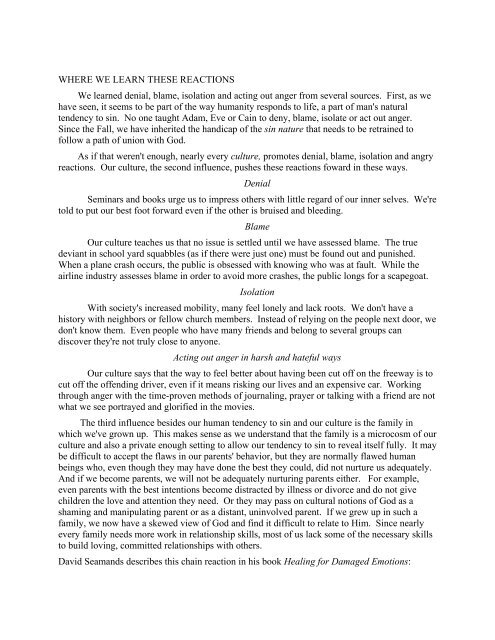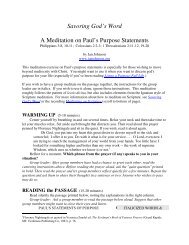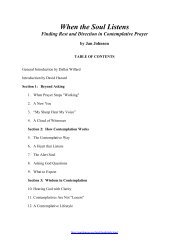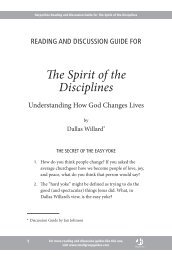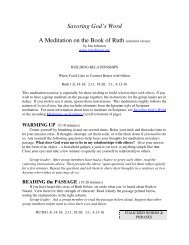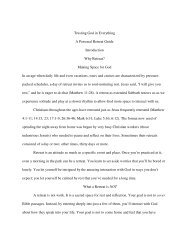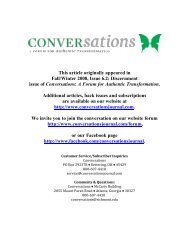FREE Download - Jan Johnson
FREE Download - Jan Johnson
FREE Download - Jan Johnson
Create successful ePaper yourself
Turn your PDF publications into a flip-book with our unique Google optimized e-Paper software.
WHERE WE LEARN THESE REACTIONS<br />
We learned denial, blame, isolation and acting out anger from several sources. First, as we<br />
have seen, it seems to be part of the way humanity responds to life, a part of man's natural<br />
tendency to sin. No one taught Adam, Eve or Cain to deny, blame, isolate or act out anger.<br />
Since the Fall, we have inherited the handicap of the sin nature that needs to be retrained to<br />
follow a path of union with God.<br />
As if that weren't enough, nearly every culture, promotes denial, blame, isolation and angry<br />
reactions. Our culture, the second influence, pushes these reactions foward in these ways.<br />
Denial<br />
Seminars and books urge us to impress others with little regard of our inner selves. We're<br />
told to put our best foot forward even if the other is bruised and bleeding.<br />
Blame<br />
Our culture teaches us that no issue is settled until we have assessed blame. The true<br />
deviant in school yard squabbles (as if there were just one) must be found out and punished.<br />
When a plane crash occurs, the public is obsessed with knowing who was at fault. While the<br />
airline industry assesses blame in order to avoid more crashes, the public longs for a scapegoat.<br />
Isolation<br />
With society's increased mobility, many feel lonely and lack roots. We don't have a<br />
history with neighbors or fellow church members. Instead of relying on the people next door, we<br />
don't know them. Even people who have many friends and belong to several groups can<br />
discover they're not truly close to anyone.<br />
Acting out anger in harsh and hateful ways<br />
Our culture says that the way to feel better about having been cut off on the freeway is to<br />
cut off the offending driver, even if it means risking our lives and an expensive car. Working<br />
through anger with the time-proven methods of journaling, prayer or talking with a friend are not<br />
what we see portrayed and glorified in the movies.<br />
The third influence besides our human tendency to sin and our culture is the family in<br />
which we've grown up. This makes sense as we understand that the family is a microcosm of our<br />
culture and also a private enough setting to allow our tendency to sin to reveal itself fully. It may<br />
be difficult to accept the flaws in our parents' behavior, but they are normally flawed human<br />
beings who, even though they may have done the best they could, did not nurture us adequately.<br />
And if we become parents, we will not be adequately nurturing parents either. For example,<br />
even parents with the best intentions become distracted by illness or divorce and do not give<br />
children the love and attention they need. Or they may pass on cultural notions of God as a<br />
shaming and manipulating parent or as a distant, uninvolved parent. If we grew up in such a<br />
family, we now have a skewed view of God and find it difficult to relate to Him. Since nearly<br />
every family needs more work in relationship skills, most of us lack some of the necessary skills<br />
to build loving, committed relationships with others.<br />
David Seamands describes this chain reaction in his book Healing for Damaged Emotions:


